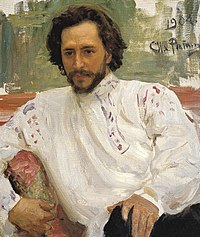Leonid Andreyev
| Leonid Andreyev | |
|---|---|

Portrait of Andreyev by Ilya Repin
|
|
| Born | Leonid Nikolaievich Andreyev 21 August 1871 Oryol, Oryol Governorate, Russian Empire |
| Died | 12 September 1919 (aged 48) Mustamäki, Finland |
| Nationality | Russian |
| Period | 1890s–1910s |
| Genre | Fiction, Drama |
| Literary movement | Realism • Naturalism • Symbolism • Expressionism |
| Children | Daniil Andreyev, Vadim Andreyev |
|
|
|
| Signature | |
Leonid Nikolaievich Andreyev (Russian: Леони́д Никола́евич Андре́ев, 21 August [O.S. 9 August] 1871 – 12 September 1919) was a Russian playwright, novelist and short-story writer, who is considered to be a father of Expressionism in Russian literature. He is one of the most talented and prolific representatives of the Silver Age period. Andreyev's style combines elements of realist, naturalist, and symbolist schools in literature.
Born in Oryol, Russia within a middle-class family, Andreyev originally studied law in Moscow and in Saint Petersburg. He became police-court reporter for a Moscow daily, performing the routine of his humble calling without attracting any particular attention. At this time he wrote poetry and made a few efforts to publish it but was refused by most publishers. In 1898 his first short story, "Bargamot and Garaska" ("Баргамот и Гараська"), was published in the "Kurier" newspaper in Moscow. This story came to the attention of Maxim Gorky who recommended that Andreyev concentrate on his literary work. Andreyev eventually gave up his law practice, fast becoming a literary celebrity, and the two writers remained friends for many years to come. Through Gorky, Andreyev became a member of the Moscow Sreda literary group, and published many of his works in Gorky's Znanie collections.
Andreyev's first collection of short stories and short novels (повести) appeared in 1901, quickly selling a quarter-million copies and making him a literary star in Russia. In 1901 he published "Стена" ("The Wall"), 1902, he published "В тумане" ("In the Fog") and "Бездна" ("The Abyss,") which was a response to "The Kreutzer Sonata" by Leo Tolstoy. These last two stories caused great commotion because of their candid and audacious treatment of sex. In the years between 1898 and 1905 Andreyev published numerous short stories on many subjects, including life in Russian provincial settings, court and prison incidents (where he drew on material from his professional life), and medical settings. His particular interest in psychology and psychiatry gave him an opportunity to explore insights into the human psyche and to depict memorable personalities who later became classic characters of Russian literature ("Thought" 1902).
...
Wikipedia
